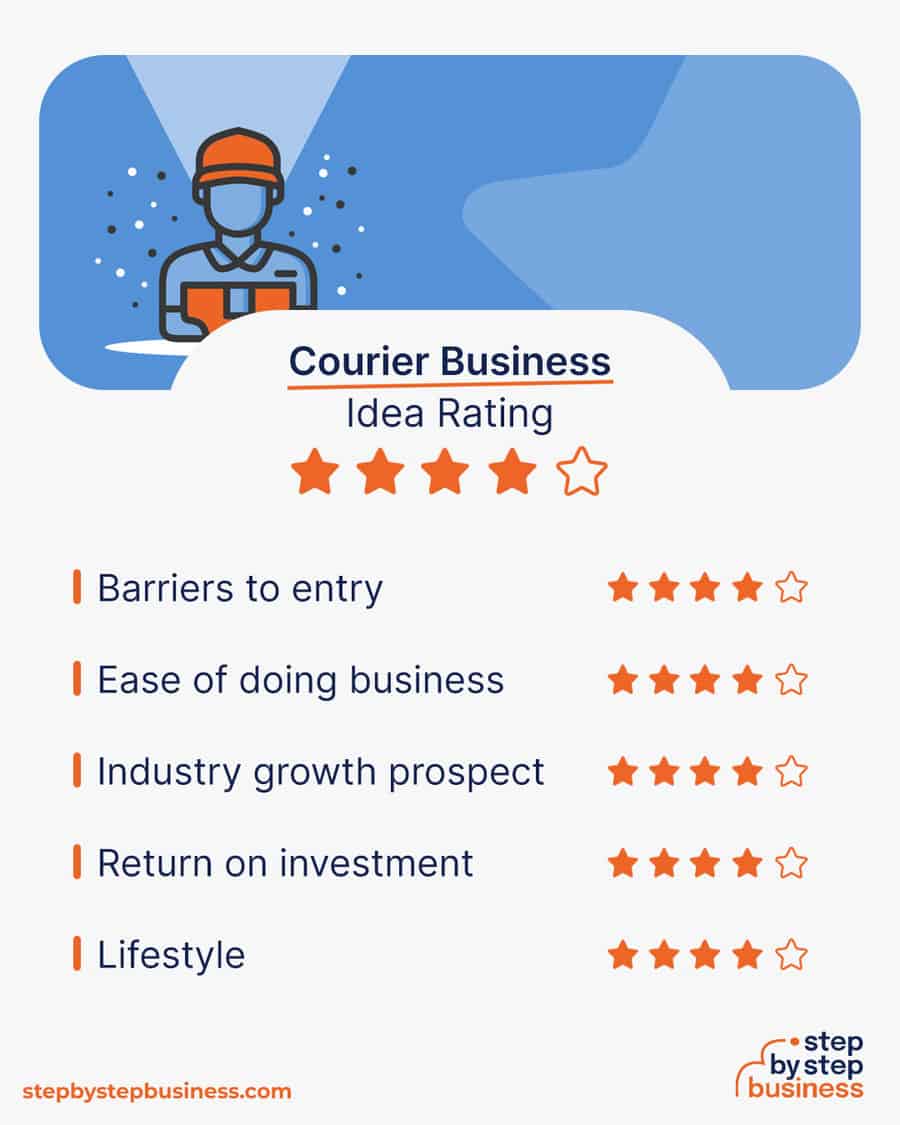Breaking into the Courier Industry: Understanding the Basics
Starting a courier business can be a lucrative venture, especially with the growing demand for delivery services. The rise of e-commerce and the need for fast, reliable shipping have created a vast market for entrepreneurs to capitalize on. However, breaking into the courier industry requires careful planning and research. To successfully start a courier business, it’s essential to understand the basics of the industry and the key factors that contribute to its success.
One of the primary considerations when starting a courier business is the type of services to offer. Will you specialize in same-day delivery, medical deliveries, or e-commerce logistics? Understanding your target market and the services they require is crucial in determining the direction of your business. Conducting market research and analyzing competitors will help you identify gaps in the market and opportunities to differentiate your business.
Another critical aspect of starting a courier business is developing a comprehensive business plan. This plan should outline your business goals, target market, marketing strategies, financial projections, and operational logistics. A well-structured business plan will serve as a roadmap for your business, helping you navigate the challenges of the industry and make informed decisions.
In addition to a solid business plan, it’s essential to understand the regulatory requirements of the courier industry. This includes obtaining necessary licenses and permits, complying with safety regulations, and adhering to industry standards. Failure to comply with these regulations can result in fines, penalties, and damage to your business reputation.
When researching how to start a courier business, it’s also important to consider the financial aspects of the venture. This includes determining startup costs, ongoing expenses, and revenue projections. A thorough understanding of your business’s financials will help you make informed decisions and ensure the long-term success of your business.
By understanding the basics of the courier industry and carefully planning your business, you can set yourself up for success and capitalize on the growing demand for delivery services. Whether you’re looking to start a small, local courier business or a large, national operation, the key to success lies in careful planning, research, and a commitment to excellence.
Defining Your Niche: Identifying Your Target Market and Services
When starting a courier business, it’s essential to identify a specific niche or target market to differentiate yourself from competitors and establish a strong market presence. A well-defined niche will help you tailor your services to meet the unique needs of your target market, increasing customer satisfaction and loyalty. To determine the best niche for your courier business, conduct market research to identify gaps in the market and opportunities to capitalize on emerging trends.
One approach to identifying your niche is to analyze your competitors and identify areas where they are lacking. For example, if you notice that existing courier services in your area are not catering to the medical industry, you may consider specializing in medical deliveries. Similarly, if you identify a growing demand for same-day delivery services, you may choose to focus on this area.
Another approach is to consider the types of services that are in high demand. For instance, e-commerce logistics is a rapidly growing market, and specializing in this area could provide a significant competitive advantage. Alternatively, you may choose to focus on a specific geographic region, such as a busy metropolitan area or a rural community with limited delivery options.
Once you have identified your niche, it’s essential to develop a comprehensive understanding of your target market. This includes researching their needs, preferences, and pain points to develop services that meet their unique requirements. For example, if you are targeting the medical industry, you may need to develop specialized services such as refrigerated transport or secure handling of sensitive medical equipment.
By defining your niche and understanding your target market, you can develop a courier business that is tailored to meet the unique needs of your customers. This will not only help you differentiate yourself from competitors but also establish a strong reputation in the market and drive long-term success. When researching how to start a courier business, it’s essential to consider the importance of niche identification and target market analysis in establishing a successful and sustainable business.
Obtaining Necessary Licenses and Permits: Navigating Regulations
When starting a courier business, it’s essential to obtain the necessary licenses and permits to operate legally. Failure to comply with regulations can result in fines, penalties, and even business closure. To ensure you’re meeting all the requirements, research the specific licenses and permits needed for your business, including local, state, and federal regulations.
One of the primary licenses required for a courier business is a business license, which typically involves registering your business with the state and obtaining a tax ID number. You may also need to obtain a sales tax permit, especially if you’re delivering goods that are subject to sales tax. Additionally, you may need to obtain a permit from the Department of Transportation (DOT) if you’re operating a commercial vehicle.
Other licenses and permits you may need to obtain include a motor carrier permit, a hazardous materials permit, and a permit for transporting oversized or overweight loads. It’s also essential to check with your local government to determine if there are any specific licenses or permits required to operate a courier business in your area.
To obtain the necessary licenses and permits, you’ll typically need to submit an application and pay a fee. You may also need to provide documentation, such as proof of insurance, vehicle registration, and a business plan. It’s essential to ensure you have all the required documents and information before submitting your application to avoid delays or rejection.
In addition to obtaining licenses and permits, it’s also crucial to comply with industry regulations, such as those related to safety, security, and environmental protection. For example, you may need to implement safety protocols for handling hazardous materials or develop a plan for reducing your business’s carbon footprint.
When researching how to start a courier business, it’s essential to understand the importance of obtaining necessary licenses and permits and complying with industry regulations. By doing so, you can ensure your business operates legally and efficiently, reducing the risk of fines, penalties, and reputational damage.
Building a Fleet: Choosing the Right Vehicles and Equipment
When starting a courier business, one of the most critical decisions you’ll make is selecting the right vehicles and equipment for your fleet. The type of vehicles and equipment you choose will depend on the specific needs of your business, including the type of packages you’ll be delivering, the distance you’ll be traveling, and the budget you have available.
One of the primary considerations when choosing vehicles for your courier business is fuel efficiency. With the rising cost of fuel, it’s essential to select vehicles that are fuel-efficient to minimize your operating costs. Additionally, you’ll want to consider the reliability of the vehicles, as well as their cargo capacity and maneuverability.
Another important factor to consider is the type of equipment you’ll need to transport packages safely and efficiently. This may include items such as package handlers, dollies, and straps. You’ll also want to consider investing in technology such as GPS tracking and routing software to help streamline your operations and improve customer satisfaction.
When researching how to start a courier business, it’s essential to consider the importance of building a fleet that is well-suited to your business needs. By choosing the right vehicles and equipment, you can ensure that your business operates efficiently and effectively, providing excellent service to your customers and helping you to stay competitive in the market.
In addition to selecting the right vehicles and equipment, it’s also crucial to consider the maintenance and upkeep of your fleet. This includes regular maintenance such as oil changes and tire rotations, as well as repairs and replacements as needed. By keeping your vehicles and equipment in good working order, you can minimize downtime and ensure that your business continues to operate smoothly.
Furthermore, you may also want to consider investing in alternative fuel vehicles or electric vehicles, which can help reduce your carbon footprint and operating costs. Additionally, you can also consider partnering with a vehicle leasing company to get access to a wide range of vehicles and equipment, while also reducing your upfront costs.
Hiring and Training Drivers: Ensuring Excellent Customer Service
When starting a courier business, one of the most critical aspects of ensuring excellent customer service is hiring and training reliable, courteous drivers. Your drivers are the face of your company, and their interactions with customers can make or break your business. To ensure that your drivers provide excellent customer service, it’s essential to develop a comprehensive training program that covers topics such as safety procedures, customer interaction, and package handling.
The first step in hiring and training drivers is to develop a clear job description and requirements. This should include the necessary skills, experience, and qualifications for the job, as well as any specific requirements such as a commercial driver’s license or a clean driving record. Once you have a clear job description, you can begin the hiring process, which should include a thorough interview and background check.
Once you have hired your drivers, it’s essential to provide them with comprehensive training on your company’s policies and procedures, as well as any specific requirements for the job. This should include training on safety procedures, such as how to handle packages safely and how to respond in case of an emergency. It should also include training on customer interaction, such as how to communicate effectively with customers and how to handle customer complaints.
In addition to training on safety procedures and customer interaction, it’s also essential to provide your drivers with training on package handling. This should include training on how to properly handle and secure packages, as well as how to track and deliver packages efficiently. By providing your drivers with comprehensive training on package handling, you can ensure that your customers receive their packages safely and efficiently.
When researching how to start a courier business, it’s essential to consider the importance of hiring and training reliable, courteous drivers. By developing a comprehensive training program and providing your drivers with the necessary skills and knowledge, you can ensure that your customers receive excellent customer service and that your business operates efficiently and effectively.
Furthermore, it’s also important to consider the benefits of ongoing training and development for your drivers. This can include regular training sessions, workshops, and conferences to help them stay up-to-date with the latest industry trends and best practices. By investing in ongoing training and development, you can ensure that your drivers continue to provide excellent customer service and that your business remains competitive in the market.
Developing a Dispatch and Tracking System: Streamlining Operations
When starting a courier business, one of the most critical components of ensuring efficient operations is developing a dispatch and tracking system. This system should enable you to manage your fleet, track packages, and provide real-time updates to customers. By implementing a efficient dispatch and tracking system, you can streamline your operations, reduce costs, and improve customer satisfaction.
One of the key features of a dispatch and tracking system is real-time tracking. This enables you to track the location of your vehicles and packages in real-time, allowing you to provide accurate updates to customers and make adjustments to your routes as needed. Another important feature is automated routing, which enables you to optimize your routes and reduce fuel consumption.
When choosing a dispatch and tracking system, it’s essential to consider the specific needs of your business. This includes the size of your fleet, the type of packages you’re delivering, and the level of customer service you want to provide. You should also consider the scalability of the system, as well as its integration with other software and technology.
Some popular dispatch and tracking systems for courier businesses include GPS tracking software, transportation management systems, and logistics management software. These systems can provide a range of features, including real-time tracking, automated routing, and customer notifications.
When researching how to start a courier business, it’s essential to consider the importance of developing a dispatch and tracking system. By implementing a efficient system, you can streamline your operations, reduce costs, and improve customer satisfaction. This can help you to stay competitive in the market and achieve long-term success.
In addition to developing a dispatch and tracking system, it’s also important to consider the benefits of integrating other technology, such as mobile apps and online platforms. These can provide customers with real-time updates and enable them to track their packages online. By integrating these technologies, you can provide a seamless customer experience and stay ahead of the competition.
Marketing Your Courier Business: Attracting and Retaining Customers
When starting a courier business, one of the most critical components of success is marketing. Effective marketing can help you attract new customers, retain existing ones, and differentiate your business from competitors. In this article, we’ll outline effective marketing strategies for attracting and retaining customers, including social media marketing, online advertising, and partnerships with local businesses.
Social media marketing is a powerful tool for courier businesses. By creating a strong presence on platforms such as Facebook, Twitter, and Instagram, you can reach a large audience and build brand awareness. Use social media to share updates about your business, promote special offers, and engage with customers.
Online advertising is another effective way to reach potential customers. Use targeted ads on Google and other search engines to reach people who are searching for courier services in your area. You can also use online directories and review sites to promote your business and build credibility.
Partnerships with local businesses can also be a powerful marketing tool. Consider partnering with local retailers, restaurants, and other businesses to offer joint promotions and discounts. This can help you reach new customers and build relationships with other businesses in your community.
Developing a strong brand identity is also critical for marketing success. Use a consistent logo, color scheme, and messaging across all of your marketing materials to build recognition and trust with customers. Consider creating a customer loyalty program to reward repeat customers and encourage retention.
When researching how to start a courier business, it’s essential to consider the importance of marketing. By developing a comprehensive marketing strategy, you can attract new customers, retain existing ones, and build a successful business. Remember to track your marketing efforts and adjust your strategy as needed to ensure long-term success.
In addition to these marketing strategies, consider using technology to enhance your marketing efforts. Use email marketing software to send targeted campaigns to customers and prospects, and consider using marketing automation tools to streamline your marketing processes.
Monitoring and Adjusting: Ensuring Long-Term Success
When starting a courier business, it’s essential to continuously monitor and adjust your operations to ensure long-term success. This includes tracking key performance indicators (KPIs), gathering customer feedback, and making data-driven decisions to improve operations and stay competitive.
One of the most critical KPIs to track is customer satisfaction. This can be measured through surveys, reviews, and feedback forms. By tracking customer satisfaction, you can identify areas for improvement and make adjustments to your operations to increase customer satisfaction and loyalty.
Another important KPI to track is delivery time and efficiency. This can be measured through metrics such as on-time delivery rates, average delivery times, and delivery route optimization. By tracking these metrics, you can identify areas for improvement and make adjustments to your operations to increase delivery efficiency and reduce costs.
In addition to tracking KPIs, it’s also essential to gather customer feedback and make data-driven decisions to improve operations. This can be done through regular customer surveys, focus groups, and feedback forms. By gathering customer feedback and making data-driven decisions, you can identify areas for improvement and make adjustments to your operations to increase customer satisfaction and loyalty.
When researching how to start a courier business, it’s essential to consider the importance of monitoring and adjusting your operations to ensure long-term success. By tracking KPIs, gathering customer feedback, and making data-driven decisions, you can identify areas for improvement and make adjustments to your operations to increase customer satisfaction and loyalty.
In conclusion, starting a successful courier business requires careful planning, execution, and monitoring. By following the steps outlined in this guide, you can establish a successful courier business that meets the needs of your customers and sets you up for long-term success.







